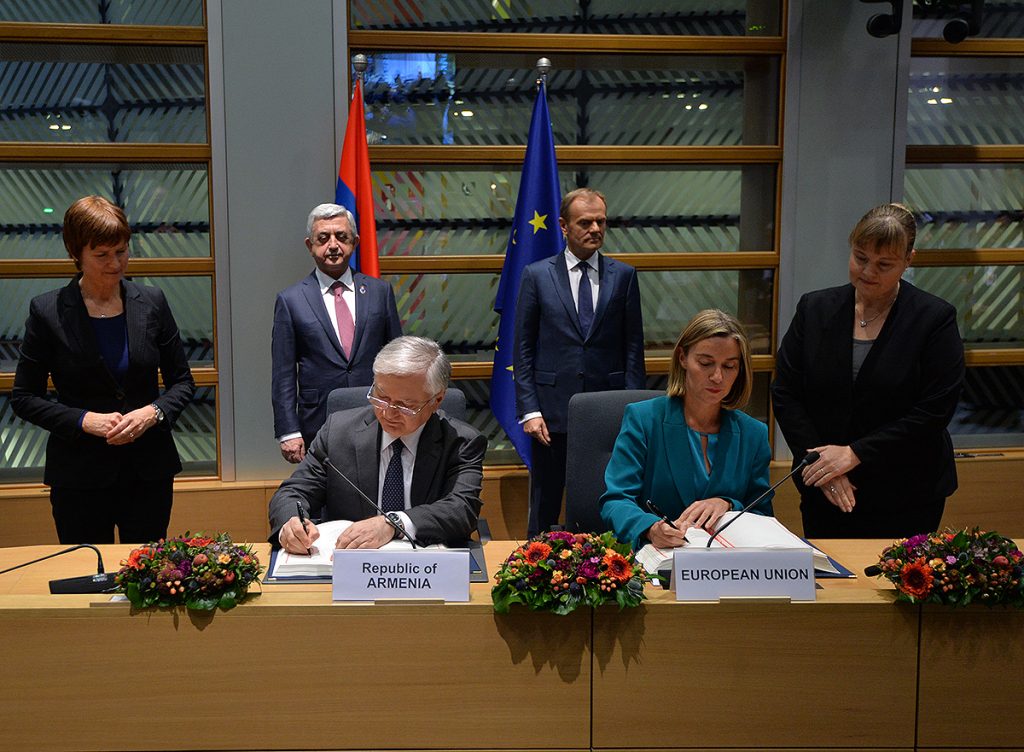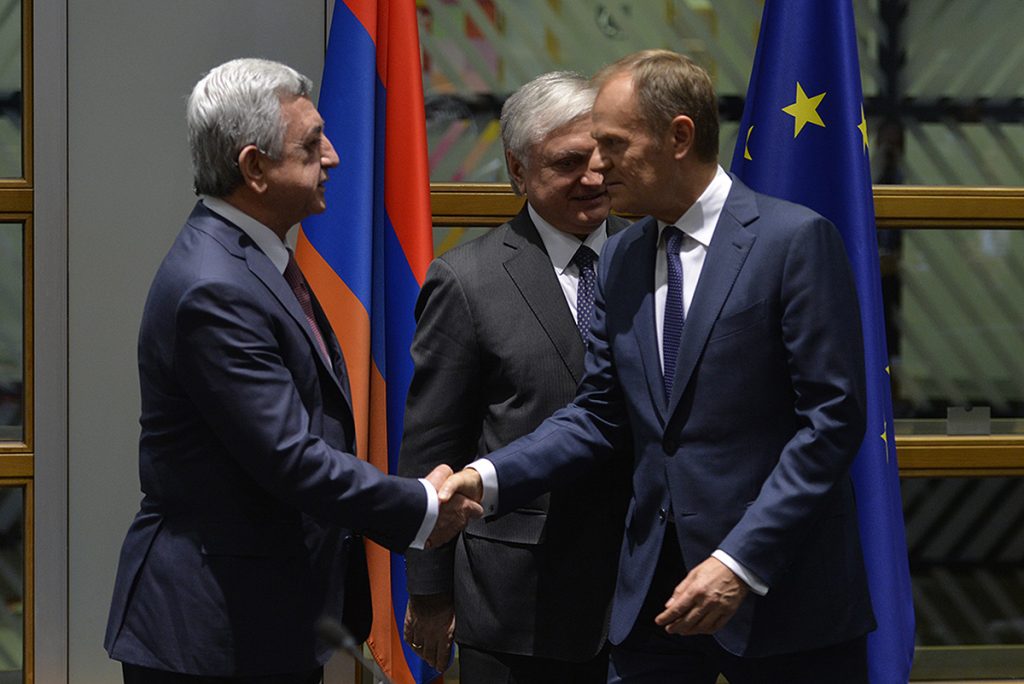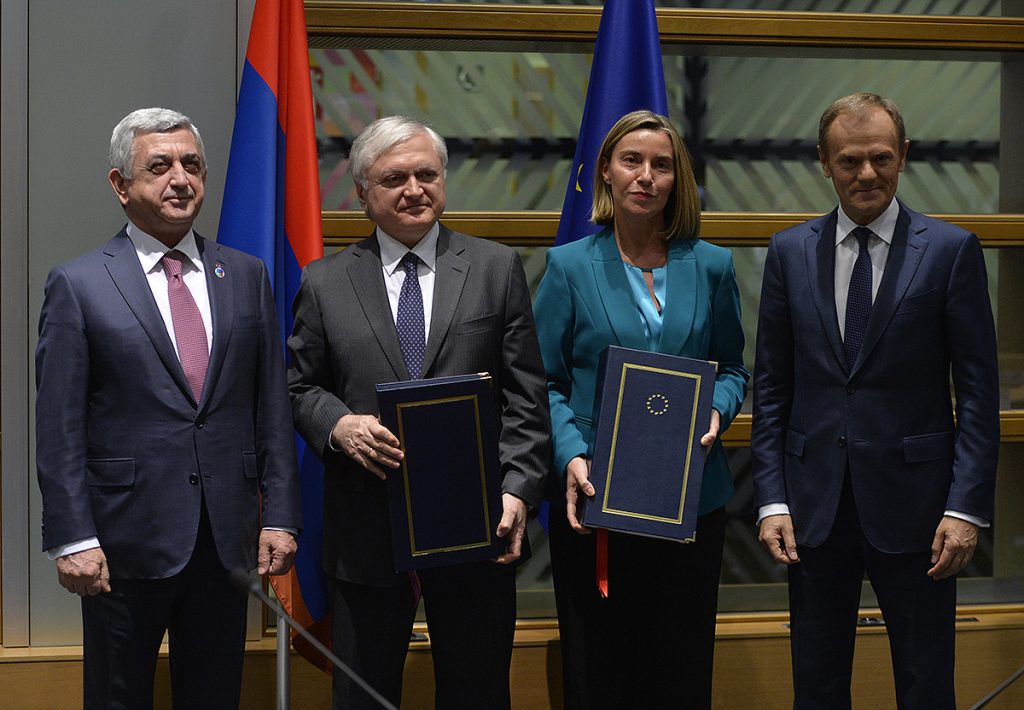BRUSSELS (A.W.)—The Republic of Armenia and the European Union signed a landmark deal on Friday, more than four years after an Armenia–EU Association Agreement was called off by Armenia in Sept. 2013.

The long-anticipated Comprehensive and Enhanced Partnership Agreement (CEPA) was signed during the Eastern Partnership Summit by theHigh Representative of the European Union for Foreign Affairs and Security Policy and Vice-President of the European Commission Federica Mogherini, on behalf of the EU, and by the Minister of Foreign Affairs Edward Nalbandian, on behalf of the Republic of Armenia. Armenian President Serge Sarkisian and President of the EU Council Donald Tusk were also present at the signing ceremony.
“The Agreement we have signed today will have a real impact on people’s lives, a positive one, both in Armenia and in the European Union. It will allow us to strengthen our cooperation on security matters, in particular through increasing resilience; to improve the investment climate, stimulating growth and jobs; and to find environmentally friendly solutions to help communities prosper and businesses grow,” said Mogherini following the signing.
According to Mogherini, the “ambitious” agreement had been a long-term objective of the EU, in order to have a deal that better reflects the priorities of the Union’s partnership with Armenia and to heighten cooperation between the two parties.

“This agreement is the first of this kind that is concluded with a party that is also a member of the Eurasian Economic Union (EEU). It will now be very important to implement it,” Mogherini went on. In Sept. 2013, Armenia announced that it would join the EEU, led by Russia, which prevented the signing of a free-trade deal that Armenia had already negotiated with the EU, slated to be signed in November of that year.
As outlined in a factsheet published by the Eastern Partnership, the newly signed CEPA looks to strengthen political dialogue and set a solid basis for the continuation of economic and social reforms by creating a better investment climate; a more empowered civil society; a safer living environment; fairer and more transparent procurement procedures; Improved product safety and consumer protection; and a cleaner, healthier environment.
Earlier in the day, President Sarkisian addressed the 2017 Eastern Partnership Summit, hailing the signing of the CEPA as an important milestones in the 25-year history of relations between Armenia and EU.
“[The CEPA] is a comprehensive document that reflects the significant developments of the recent period of our collaboration and defines the guidelines that are necessary to deepen these relations. This Agreement is not merely a legal document, but a reflection on the wealth of values of human rights and fundamental freedoms that we share,” Sarkisian said in his address, highlighting the importance of strengthening democracy and implementing needed reforms in Armenia.

Sarkisian went on to say that the importance of the CEPA is not limited to Armenia-EU relations, and that many of Armenia’s international counterparts describe the country as a nation “that brings various integration processes closer to each other,” and one “that is led by desire to reconcile and complement interests in the spirit of cooperation and cohabitation.”
“I would like to underline that throughout this process the objective Armenia pursued from the very outset was further deepening of our bilateral and multilateral relations,” the President added.
Sarkisian also took the opportunity to criticize Azerbaijani President Ilham Aliyev’s “ill-grounded accusations” against Armenia. “As much as the Azerbaijani side may try to distort and misinterpret the essence of the Nagorno-Karabagh (Artsakh) conflict and its peaceful settlement, the conflict has to be settled on the basis of three principles of international law: non-use of force or threat of force, territorial integrity, and the peoples’ right to self-determination as proposed by the OSCE Minsk Group co-chairs, which is the only structure vested with an international mandate,” he said.
Sarkisian also noted that the position of the international community on the conflict is reflected in the statements issued by the leaders of the OSCE Minsk Group co-chair countries, and that, in that context, any solution to the conflict without the exercise of Artsakh’s people’s right to self-determination is “simply impossible.”
“The UN has never adopted a resolution regarding the settlement of Nagorno-Karabagh issue. The four resolutions adopted by the UN in 1993 were about the ceasing of hostilities in Nagorno-Karabagh region, which Azerbaijan has ignored so far. And now, as 25 years have passed, in my opinion it is irrelevant to say that Armenia has not fulfilled its commitments,” Sarkisian added.


Well done Armenia its time to come out and join EU countries and Nations. Look forward to full membership soonest. Congratulations to all parocipants.
Good luck to all.
Bravo Yerevan; take as much money from Western/Globalist criminals as possible – while keeping them at an arms length. And for those wondering, yes, this agreement was blessed by Moscow.
what is a land mark agreement?\